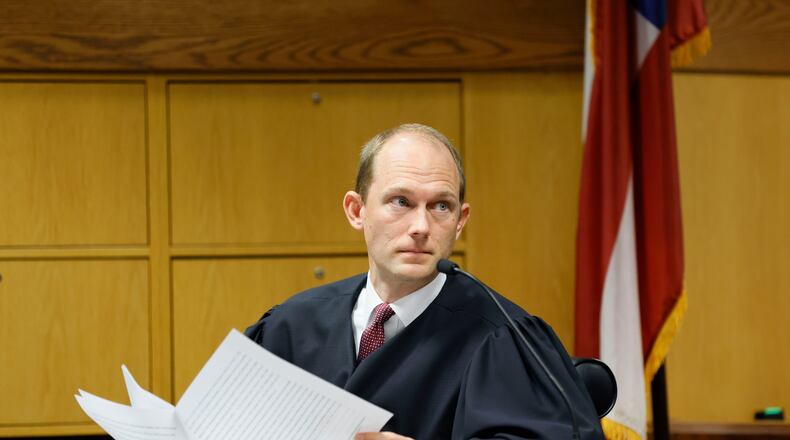Former President Donald Trump’s surprise decision not to try and move his election interference trial from Fulton County to federal court could have a significant impact on the way the racketeering case plays out in the months ahead.
In a two-page notice filed in Fulton Superior Court on Thursday, Trump’s Atlanta attorneys Steve Sadow and Jennifer Little said their client based his decision “on his well-founded confidence that this Honorable Court intends to fully and completely protect his constitutional right to a fair trial.”
While there’s still a chance that all or some of the 19 defendants are tried in federal court — five other defendants are awaiting decisions from U.S. District Court or the 11th Circuit Appeals Court — this makes it far likelier that Trump will be tried at the Fulton County Courthouse in downtown Atlanta.
Here’s what his decision could mean:
A far higher likelihood of a televised trial. One of the biggest differences between state and federal court is that the latter bars television cameras. Fulton Superior Court Judge Scott McAfee, who is overseeing the case locally, has already ordered that proceedings in his courtroom be televised. (Even housekeeping meetings have been streamed from his chambers’ YouTube channel.) That in and of itself is notable: Fulton is the only one of the four jurisdictions in which Trump has been criminally indicted to allow for cameras.
Depending on who you talk to, that’s either a great thing for democracy by encouraging transparency and public interest in the judicial process, or a terrible idea since it could create a circus akin to the O.J. Simpson trial ― or potentially expose witnesses and jurors to threats.
A known judge with conservative credentials. Conventional wisdom is that by moving proceedings to federal court, Trump and other defendants might be assigned judges who are more familiar with — and potentially more deferential to — concepts such as federal immunity and presidential power. Not only that, but there was a likelihood that at least one of the judges who would have randomly been assigned Trump’s case would have been appointed by him. But at least at the earliest stage, Trump’s case would have been heard by U.S. District Court Judge Steve Jones, an Obama administration appointee who has been skeptical of removal claims from three of Trump’s co defendants and has already ruled against former White House Chief of Staff Mark Meadows and Jeffrey Clark, a former assistant attorney general at the U.S. Department of Justice.
In opting to keep proceedings in Fulton, Trump’s attorneys avoid a potentially embarrassing hearing before Jones — one in which they would have felt pressure to put their client on the witness stand. They instead are banking that they’ll get a fairer shot before McAfee, an appointee of Republican Gov. Brian Kemp with conservative credentials who is well-respected by his colleagues. At 34, though, and less than a year on the bench, McAfee will undoubtedly face the biggest test of his career attempting to corral Trump and 18 other defendants, all with their own agendas. So far, McAfee has kept a tight grip on proceedings.
A more skeptical jury pool. One of the biggest benefits of moving proceedings to federal court is the broader, slightly more conservative jury pool. Trump won less than 27% of the vote in Fulton in 2020. In the 10-county Atlanta division from which Trump’s jury would have been pulled in federal court, the Republican won a little more than 33% of the vote, according to an analysis of 2020 voting data by The Atlanta Journal-Constitution.
Even though a jury in Fulton is likelier to be more progressive, there are still more moderate and conservative pockets of the county in its northern section. It would only take one holdout for a judge to declare a mistrial.
About the Author
Keep Reading
The Latest
Featured




